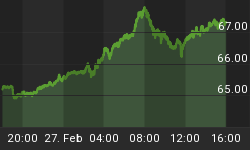Below is an excerpt from a commentary originally posted at www.speculative-investor.com on 24th September 2009.
One of the arguments put forward by deflationists (people who are forecasting deflation) is that today's monetary system is credit-based and hyperinflation is not possible under such a system. What they mean by "credit-based" is that new money is borrowed into existence, the implication being that in order to get a net increase of $1 in the total money supply there must be a net increase of at least $1 in the economy-wide debt burden. As a result (so the argument goes), the more the supply of money is inflated the more the economy is weighed down by debt, thus improving the odds of an eventual deflationary outcome.
To explain one of the two main errors in the above argument we will consider the hypothetical case of a counterfeiter named Fred. Most counterfeiters print new money and then spend it, but Fred operates a little differently in that he prints new money and then lends this new money to his customers. Furthermore, he practices double-entry bookkeeping in that every loan he makes is faithfully recorded as an asset on his balance sheet. The new money he creates goes on the "liability" side of his balance sheet.
Due to the popularity of Fred's service (his interest rates are very competitive!), the economy-wide supply of both money and debt expand rapidly. After a while, however, some of Fred's customers default on their loans. The new money that Fred created when he made these bad loans is still within the economy and remains a liability on his balance sheet, but some items on the asset side of the ledger are now worthless. Fred must therefore record a reduction in his capital, but this does not faze him because he never had any capital to begin with and the whole concept of a capital write-down is meaningless to someone who can create money out of nothing. Fred's business is actually based on stealing the capital of others by stealing their purchasing power.
Many of our readers will immediately recognise Fred's modus operandi as being similar to that of a central bank. The central bank generally lends new money into existence, but this will never impose a limitation on its ability to expand the money supply because, unlike a legitimate business, the strength of its balance sheet is not a primary consideration (anyone who believes that the Fed is constrained in any way by a need/desire to maintain a solid balance sheet hasn't been paying attention over the past year). It's fair to say that a willing lender always needs a willing borrower, but it's also fair to say that over the next several years the part of the latter will very likely be 'played to the hilt' by the government.
The other critical error in the argument summarised in our opening paragraph is that the current monetary system is not completely "credit-based", in that the central bank's ability to expand the money supply is not restricted by its ability to make new loans. The central bank (the Fed in the US) actually has the power to monetise anything it wants. In fact, some central banks, including the Fed, have already stepped outside the bounds imposed by the traditional process of lending new money into existence. Taking one specific example, over the past 12 months the Fed has monetised (purchased with money created 'out of thin air') 650 billion dollars of mortgage-backed securities (MBS). To put it another way, over the past year the Fed has gone into the marketplace and bought $650B worth of a particular type of asset, resulting in $650B being added to the US money supply with no corresponding increase in debt. Moreover, there is nothing sacred about mortgage-backed securities (the Fed could choose to monetise something/anything else).
In summary, the monetary system is only "credit-based" up to a point, and even if it were totally "credit-based" the central bank would still have practically unlimited ability to expand the money supply. Does this mean that deflation is impossible under the current monetary system unless the central bank is willing to allow the system to deflate? Yes.
The central bank can always inflate the money supply, but it attempts to do so in a way that does not bring about an obvious inflation problem (from the central bank's perspective, inflation becomes an obvious problem once the general price level and government bond yields begin to rise rapidly). Consequently, the road to hyperinflation is not straight and those who predict that hyperinflation lies in the near future will probably be wrong.
We aren't offering a free trial subscription at this time, but free samples of our work (excerpts from our regular commentaries) can be viewed at:http://www.speculative-investor.com/new/freesamples.html.















